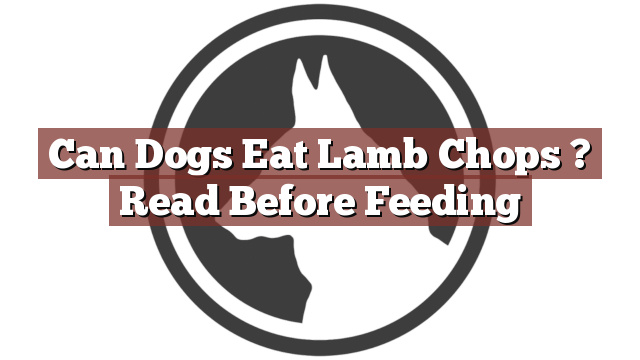Understanding Your Dog’s Dietary Needs
As a responsible pet owner, it is crucial to understand your dog’s dietary needs to ensure their overall health and well-being. While dogs are primarily omnivorous animals, their diet should consist mostly of high-quality commercial dog food that provides the necessary nutrients they need. However, many dog owners often wonder if they can incorporate human food into their pet’s diet, such as lamb chops. To determine if dogs can eat lamb chops, it’s essential to consider their nutritional requirements and potential health implications.
Can Dogs Eat Lamb Chops? Read Before Feeding
Can dogs eat lamb chops? The answer is yes but with some considerations. Lamb chops can be a delicious treat for your furry friend, packed with protein and essential vitamins and minerals. However, it’s important to remember that dogs have different dietary needs than humans. While lamb is generally safe for dogs, it’s crucial to prepare it properly and in moderation.
Before feeding your dog lamb chops, ensure that the meat is cooked thoroughly, without any spices, seasonings, or additional ingredients that may be harmful to dogs. Additionally, it is important to remove any bones from the lamb chops before serving, as they can pose a choking hazard or potentially cause injury to your dog’s digestive system.
Pros and Cons of Feeding Lamb Chops to Your Dog
Feeding lamb chops to your dog can have both pros and cons. On the positive side, lamb is a great source of protein, which is vital for your dog’s muscle growth and development. It also contains essential amino acids that contribute to a healthy coat and skin. Additionally, the natural fats in lamb can provide your dog with a good energy source.
However, there are also some potential drawbacks to consider. Lamb chops can be high in fat, which may not be suitable for all dogs, especially those with certain health conditions like pancreatitis or obesity. Furthermore, lamb is known to be a common allergen for dogs, so if your dog has a history of food allergies or sensitivities, introducing lamb chops may not be the best idea.
Conclusion: Considerations for Feeding Lamb Chops to Your Dog
In conclusion, while dogs can eat lamb chops, it’s important to consider several factors before adding them to your pet’s diet. Cooking the lamb thoroughly, removing any bones, and avoiding seasonings or spices are critical steps to ensure your dog’s safety. Additionally, it’s advisable to consult with your veterinarian before introducing lamb chops or any new food into your dog’s diet, especially if they have any pre-existing health conditions or food allergies.
Remember that a balanced and nutritionally complete commercial dog food should always be the foundation of your dog’s diet. Treats like lamb chops should be used sparingly and only as an occasional addition to their regular meals. By being mindful of your dog’s dietary needs and consulting with a professional, you can keep them happy, healthy, and well-fed.
Thank you for taking the time to read through our exploration of [page_title]. As every dog lover knows, our furry friends have unique dietary needs and responses, often varying from one canine to another. This is why it's paramount to approach any changes in their diet with caution and knowledge.
Before introducing any new treats or making alterations to your dog's diet based on our insights, it's crucial to consult with a veterinarian about [page_title]. Their expertise ensures that the choices you make are well-suited to your particular pet's health and well-being.
Even seemingly harmless foods can sometimes lead to allergic reactions or digestive issues, which is why monitoring your dog after introducing any new food item is essential.
The content provided here on [page_title] is crafted with care, thorough research, and a genuine love for dogs. Nevertheless, it serves as a general guideline and should not be considered a substitute for professional veterinary advice.
Always prioritize the expert insights of your veterinarian, and remember that the health and happiness of your furry companion come first.
May your journey with your pet continue to be filled with joy, love, and safe culinary adventures. Happy reading, and even happier snacking for your canine friend!

